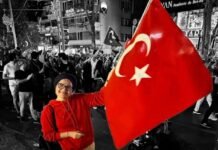A total of 1,388 people have been victims of enforced disappearance in Turkey in the last 40 years, according to the southeastern Diyarbakır branch of the Human Rights Association (İHD).
At a press conference the İHD called for the establishment of a committee to investigate previous enforced disappearances and bring justice to the victims.
Abdullah Zeytun, chair of the İHD’s Diyarbakır branch, said enforced disappearances and unsolved murders were especially common in the 1990s. He said effective investigations into these incidents were not carried out and the perpetrators were not brought to justice.
Fırat Akdeniz of the İHD said thousands of people disappeared in Turkey between 1980 and 2001 because of the security forces and paramilitary groups linked to them. “The real number of people is actually higher as we only know about the reported cases,” he said. “But what we know for sure is that these groups linked to the state have carried out murders and they have never been held accountable in court.”
In the 1990s, at the height of the armed conflict between Turkish security forces and the Kurdistan Workers’ Party (PKK), an armed secessionist group listed as a terrorist organization by Turkey, the European Union and the United States, disappearances particularly targeted members of Turkey’s Kurdish minority. After some progress thanks to the improvement of the human rights situation in Turkey in the 2000s, enforced disappearance started to reemerge following a July 2016 coup attempt.
According to human rights activists enforced disappearances have again become worryingly common in Turkey and are not effectively investigated by prosecutors.
A new report titled “Enforced Disappearances: Turkey’s Open Secret” published by OTHERS, a Brussels-based NGO, between the 1980 coup d’état and the attempted coup in July 2016, up to 2,000 people were believed to have been forcibly disappeared in Turkey, with some 450 confirmed cases.
Nearly 30 people have reportedly been abducted by Turkish intelligence since 2016. Most of the abductions targeted members of the Gülen movement, a faith-based group inspired by Muslim cleric Fethullah Gülen. Many of the abductees mysteriously reappeared in police custody in Ankara after six to nine-month absences.
Apparently intimated, most of them kept their silence after their reappearance. Speaking at a court hearing in February 2020, one of the abductees, Gökhan Türkmen, revealed that he had been held incommunicado at a black site in Ankara run by Turkey’s intelligence agency and subjected to severe torture during his 271-day stay. Türkmen was the object of threats and was sexually harassed and abused during his enforced disappearance. He also alleged that he was visited in prison and threatened no less than six times by officials who introduced themselves as intelligence officers, pressuring him to retract his allegations of abduction and torture made at the February hearing.
Most recently, Hüseyin Galip Küçüközyiğit, a former bureaucrat, went missing on December 29, 2020, after he left his office in Ankara. His family started a campaign on social media expressing their fear that he might have been abducted by Turkish intelligence.
Despite several applications, a prosecutor was not assigned to investigate the case of Küçüközyiğit until 18 days after his disappearance. His whereabouts are still unknown.
Another former bureaucrat, Yusuf Bilge Tunç, has been missing since August 6, 2019.
Turkish President Recep Tayyip Erdoğan has been targeting followers of the Gülen movement since the corruption investigations of December 17-25, 2013, which implicated then-Prime Minister Erdoğan, his family members and his inner circle.
Dismissing the investigations as a Gülenist coup and conspiracy against his government, Erdoğan designated the movement as a terrorist organization and began to target its members. He intensified the crackdown on the movement following a coup attempt on July 15, 2016 that he accused Gülen of masterminding.














